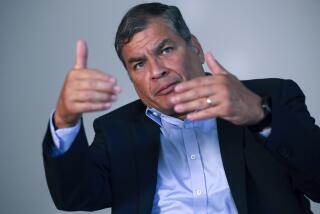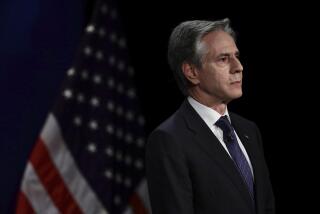U.S. Revokes Colombian Presidentâs Visa, Citing Ties to Drug Traffickers
WASHINGTON â In an unusually severe move, the Clinton administration Thursday revoked the U.S. visa of Colombian President Ernesto Samper, accusing him of knowingly aiding narcotics traffickers in his country by accepting money from them in exchange for lenient policies.
The extraordinary action--one of the few times in memory that the United States has barred a head of government from entering this country--appeared designed to send a signal to Bogota that Washington wants Samper out and Colombia under new leadership.
âOur message today is clear . . . ,â said State Department spokesman Nicholas Burns, âto demonstrate to the Colombian people, to the government of Colombia and to everyone else in our hemisphere that we do mean business.â
The move, which Burns said was approved by President Clinton, followed a vote by Colombiaâs Congress on June 12 that exonerated Samper of allegations that he accepted money for his presidential campaign from the Cali drug cartel. The ruling effectively guarantees that he will not be prosecuted.
The action was the last in a series of measures by the United States intended to pressure Samper into resigning. In March, the Clinton administration cut off most foreign aid to Colombia; in the past few weeks, it has revoked the visas of several key Samper lieutenants.
Some Colombians fear, however, that the U.S. action might backfire and strengthen Samperâs hold on power by making it more difficult for opponents to oust him without seeming to give in to American pressure.
âThe people who want to get rid of Samper will find it more difficult to do so because they will be seen as taking the same position as Washington, which for a Colombian is unacceptable,â said Alejandro Reyes, a political analyst at Bogotaâs National University.
âThe United States is committing an error with this decision,â Reyes added. It âwill benefit Samper and force the entire nation to rally around him. Even his critics will feel obliged to back him . . . against foreign interference.â
Official reaction from Colombia was immediate, with the Samper government condemning the United States for meddling in the countryâs internal affairs, saying Colombians are âangered by these types of unilateral and interventionist measures.â
The government also announced that despite the U.S. action, Samper intends to address the annual meeting of the United Nations General Assembly in New York in September, with or without a U.S. visa--a privilege that he ordinarily would be allowed under international custom.
The harsh U.S. action was among several strong measures recommended by Myles Frechette, the U.S. ambassador to Colombia, in a classified cable earlier this year after lower-profile negotiations failed to produce visible results, according to Western diplomats.
A few weeks ago, Colombia turned down a U.S. request to extradite four leading figures in the Cali cartel, three of whom are in Colombian jails. On Tuesday, Colombian authorities seized 110 properties belonging to two of the men, but Washington dismissed the move as a mere gesture.
Analysts said that the U.S. action Thursday was in part a response to appeals by opponents of the Samper government that Washington take a tougher stand against the Colombian president.
Throughout the dispute with Samper, the administration has sought to continue its anti-narcotics program in the country, providing financial aid for the drug fight and--more recently--helicopters to help federal authorities there battle the cartels.
Burns and other key officials took pains Thursday to point out that Washington still hopes to continue to work with opponents of the Samper government, particularly with Colombian law enforcement officials who want to crack down on the Cali cartel.
They portrayed the U.S. action as a âpersonalâ one aimed directly at Samper and not at Colombia as a whole. âWe hope very much that the Colombian government will rethink its commitment to narcotics trafficking,â Burns said.
U.S. officials conceded that revoking Samperâs visa is unlikely to have much practical impact. Samper apparently had no plans to visit here soon and, if he wants to attend the U.N. General Assembly meeting in September, the United States would probably allow it.
State Department officials said they could think of only one other time when the United States has blocked entry by a sitting head of government--in 1987, when it barred Austrian President Kurt Waldheim after disclosure of his Nazi past.
Many analysts in Colombia fear that the split over Samper could deepen in the wake of the latest U.S. action.
In a worst-case scenario, analysts said, the Colombian government could sever relations with the United States entirely, calling for the ouster of Frechette and a suspension of American investment and trade. But they said that such action seems unlikely now.
Times staff writer Pine reported from Washington and special correspondent Ambrus from Bogota.
More to Read
Sign up for Essential California
The most important California stories and recommendations in your inbox every morning.
You may occasionally receive promotional content from the Los Angeles Times.










